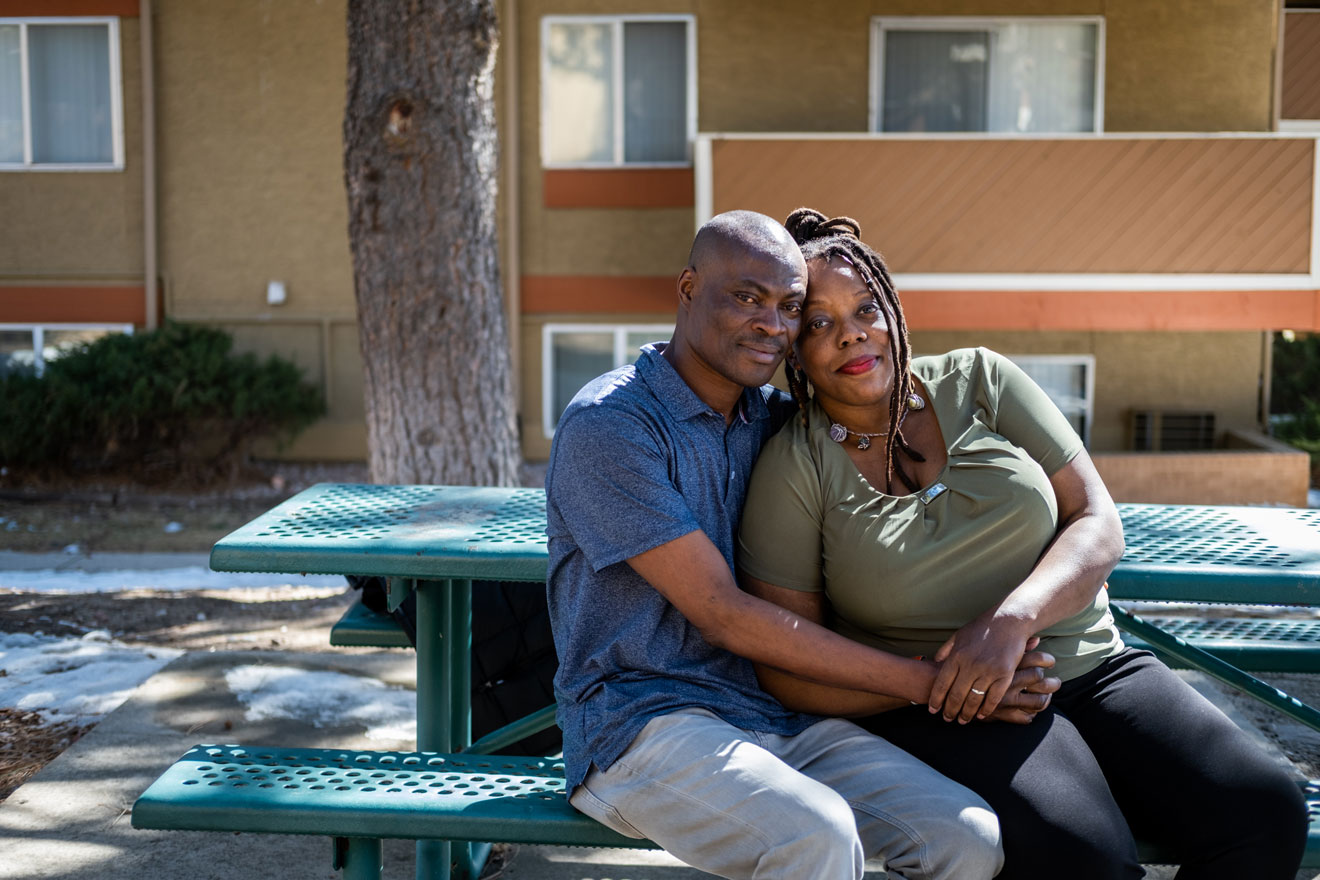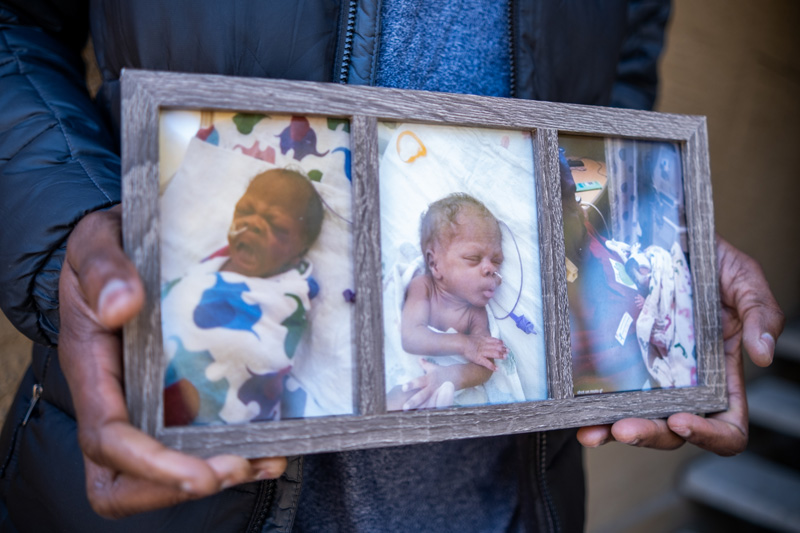
Charles and Jennifer Tiko, photographed outside their Colorado Springs home on March 19, 2021. Photos by Eli Imadali
Charles and Jennifer Tiko, photographed outside their Colorado Springs home on March 19, 2021. Photos by Eli Imadali
A year after the first COVID-19 cases were diagnosed in Colorado, we are still learning about the effects of the virus on pregnant people. Research shows a complicated picture, including that some people who get sick with COVID-19 while pregnant may be at higher risk for severe illness and death.
That may be especially true among Black people, who already face high rates of maternal and infant mortality in the United States.
Jennifer Tiko was diagnosed with COVID-19 in November 2020 as part of routine testing at the Zebulon Pike youth detention facility in Colorado Springs, where she works as a cook.
Six months pregnant at the time, Tiko said the “coronavirus held me hostage.” It was hard to breathe, her sinuses ruptured; she was so sick that she sometimes threw up 15 times a day.
“I was terrified for my own life and my son’s life,” says Tiko, 39.
Tiko says she recovered, returned to work, then relapsed with terrifying symptoms—a spiral of health problems affecting her pregnancy, labor and life today. Tiko says she didn’t go to the hospital for COVID-19 because she was fearful after hearing stories of people dying alone in the hospital. At the same time, quarantines and lingering symptoms forced her to miss prenatal appointments along the way. She delivered her tiny son Ayomide at 29 weeks.
For most pregnancies, risks related to coronavirus infection are relatively small. A large-scale study of pregnant women in a high-volume public hospital in Dallas, Tex. found that coronavirus infection was not linked to premature birth or maternal hospitalization. However, a small number of women who became severely ill with COVID-19 were likely to experience miscarriage and preterm birth, according to the November 2020 study in the Journal of the American Medical Association.
Longstanding health inequities remain. Black infants in the U.S. are much more likely than white infants to be born preterm, and a study of pregnant women at two hospitals in New York City found that those disparities remained but were not exacerbated during the pandemic.
Black and Hispanic women with COVID-19 disease during pregnancy also die at higher rates than other pregnant women with the disease, according to an October 2020 report from the U.S. Centers from Disease Control and Prevention. That is a reflection of the greater toll of COVID-19 on communities of color because of structural racism and poverty, and a higher likelihood of working in essential workplaces with greater risks for exposure to the virus.
“Birthing a Black baby, in general, stress levels are going to be higher. When you add COVID into that, it really magnifies everything so much more,” says Shelby Irvin, who is a lactation counselor, doula and childbirth educator serving Black and Brown families in Colorado Springs through her private practice The Soulful Mama.
For people who are pregnant now, there is hope that the worst outcomes may be preventable as the COVID-19 vaccine rolls out. In Colorado, pregnant people are now eligible to receive the COVID-19 vaccine, though appointments can be hard to come by.
Diagnosis, Quarantine, Work—Then Relapse
In a survey of over 900 pregnant women in Philadelphia during the pandemic, Black women were more likely to report that their jobs were negatively impacted during the pandemic, had more concerns about the lasting economic burden, and more worries about their prenatal, birth and postnatal experience than white women.
“It seemed like a ton of bricks were dropped on me,” says Tiko when she found out she had COVID-19. Her husband Charles, who works at Walmart, and mother also had COVID-19, with milder cases.
Tiko quarantined in her home for 14 days, but when she returned to work, she could barely stand for her 8-hour shifts in the kitchen. She worked one day before relapsing with symptoms such as fever, pneumonia and chills. She took over-the-counter medications like Robitussin and Imodium.
“When I went through COVID, I really did feel alone. … I was afraid that if I went to the hospital, my chances of survival might not be that great,” Tiko says. She knows that Black people are more likely to die of the disease.
Six months into her pregnancy, she had lost 11 pounds and her baby wasn’t gaining weight. She discovered she might need to be induced to protect her baby. Tiko didn’t anticipate just how early her baby would come.
A Rush to the Hospital
After her second bout with symptoms, Tiko returned to work for two weeks in January, before she developed preeclampsia, a medical complication during pregnancy involving hypertension. Without treatment, preeclampsia—which occurs at much higher rates among women of color—can be fatal for mothers and babies.
Tiko noticed she couldn’t wear some of her shoes anymore, but when she went to her physician in late January, nurses noticed her ankles were so swollen from preeclampsia that her skin was blistering under the pressure.
Tiko called her husband and mother, who together rushed her to a hospital in Colorado Springs, where she stayed for a week before having an emergency C-section because of her high blood pressure. Her doula Irvin was not allowed in the hospital because of COVID-19 restrictions, so instead Irvin talked on the phone and videoconferenced with Tiko before surgery and after delivery.
Tiko had envisioned a home birth with a midwife and doula before she got COVID: “To be told you have no option [but have a C-section] and your son is struggling for life, it hurt my soul.” She praises the nurses and physicians who calmly delivered her son Ayomide in the middle of the night on Jan. 31.
“I was crying I was so happy to see him,” says Tiko, as she watched her husband walk their son to the neonatal intensive care unit.

Charles Tiko holds framed family photos of baby Ayomide, who is staying in the neonatal intensive care unit until he’s strong enough to come home.
Holding Baby Ayomide
Tiko and her husband could only hold Ayomide’s hand, who was 2 pounds, 5 ounces when he was born, through a window in the incubator the first days of his life.
Tiko told Ayomide’s pediatrician, “Give him more grace because he’s been through a lot. He was born early, and he had to fight off the coronavirus with his mom.”
Now back at home, Tiko and her husband visit Ayomide in the hospital as often as they can. She says her family, especially Charles, have been incredibly supportive throughout. They are looking forward to their son coming home, perhaps in April.
Tiko, for whom breastfeeding has been a priority, continues to try to pump breast milk that can then be given to Ayomide with a bottle. Pain from the IV ports during her hospitalization makes it hard to move her arms to pump breast milk. Tiko says that she no longer has COVID-19 symptoms.
Finally, in the first week of February, the nurses told Tiko she could hold Ayomide skin-to-skin on her chest. She washed her hands, put a mask on, and slipped off her shirt. She held him gently as she felt his small hands and fingers grip her skin. She listened to him breathe, cry and fall back to sleep.
“It was so amazing. He was so soft. Tiny and precious.” She held him for three hours.